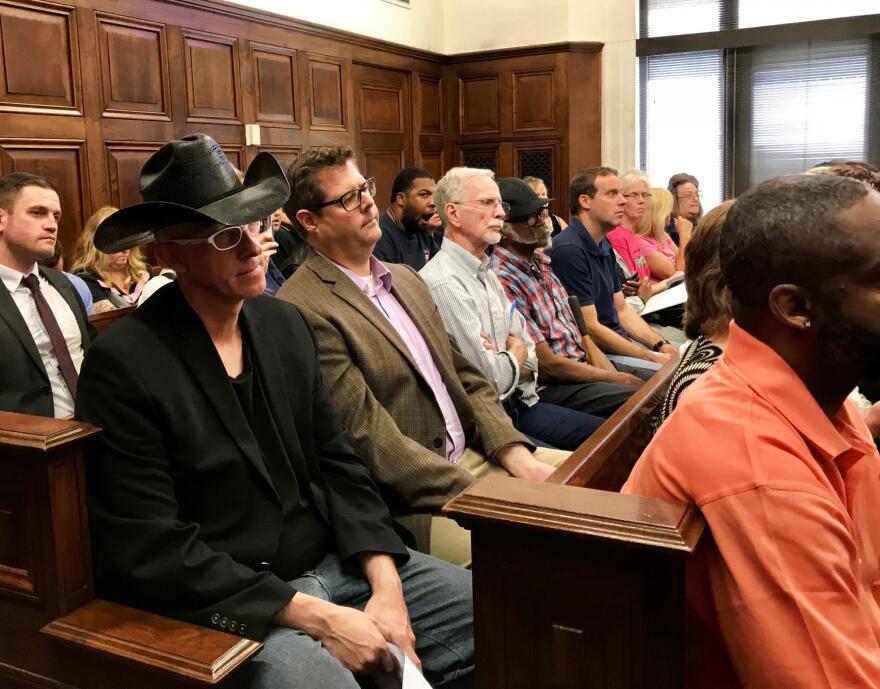Destiny Williams came to Second Chance Village from the woods, after being addicted to heroin for about three years.
“It’s helped change my life,” Williams says. “I’ve been clean for about 14 months now and have a new baby and got a place and start a new job this week.”
Williams and her now 3-month-old son, James, have finally been able to move out of the tent city, which is squeezed onto a slip of land a few blocks from the old Goodyear headquarters in east Akron.
“He was conceived here, actually, so he’s the first Second Chance baby,” Williams says.
Akron continues to struggle with what to do with the tent city– and with what to do with its bigger homelessness problem. For at least for the next two months, other homeless people will continue to have a place to stay.
Some people see Williams’ story as the exception, though, and Second Chance as a blight. The tent city abuts Annunciation Terrace, a complex for moderate-income seniors, some of whom are leading the protest against the congregation that took root about 18 months ago.
Cynthia Patterson looks across the parking lot toward the tents. She complains of noise, odors, drinking, aggressive panhandling, even the loss of trees that used to soften her morning view.
But as a former crack addict, Patterson says her concern is broader.
“I don’t have anything against the homeless people. By the grace of God, it used to be me,” Patterson says. “I just think there’s a better way to help these people than to provide a way for them to survive outside. That’s not humanity.”

More Than A Legal Argument
Patterson was one of about a dozen people who showed up at an Akron Planning Commission hearing last week to protest the request for special permit to operate Second Chance as a campground. The city zoning code has no such designation.
But more than 50 of those packed into the City Council chambers – and others in the hall – argued passionately for the permit, saying a tent city beats the alternative.
“Everybody feels safe, everybody feels like a family, a community,” said one attendee.
"Tents are not ideal for people with disabilities,” another added. “But these shelters at least provide a safe alternative to sleeping alone, unprotected and unsheltered."
"I think on the streets he would not have been saved because no one would have gave a dang because they were doing drugs probably with him,” someone chimed in.
Many came to City Hall by a bus chartered by Sage Lewis, the owner of the land and a black-cowboy-hatted thorn in the city’s side.
The hat isn’t the only thing that makes Lewis stand out on the bus. His booming voice rises as he talks about his tents as one alternative to the streets.
“There are people living in the ditches, and under bridges and on the streets of Akron and truly all of America and that we need more solutions to help these people transition back into society,” Lewis said.
The theme continued as he testified to the planning commission.
"I'm embarrassed that tents are as good as I can do and America can do,” Lewis said. “But it is worlds better than what they came from."

For now, Sage Lewis has his way – kind of. Despite a staff recommendation to deny the permit, the planning commission is delaying action until its meeting next month. After that, the issue goes to City Council and a public hearing there.
With council on an August recess, the permit request isn’t likely to come up for a council vote until September. So, while technically, the tent city is illegal, it’s unlikely anything will happen until fall.
A Reprieve, For Now
If you’ve driven through Akron, you’ve likely seen Randy Holbert – his long grayish-blond hair, creviced face, and cardboard sign: “homeless handyman.”
He’s an unapologetic alcoholic, whose been kicked out of Second Chance three times for drinking. His story makes the tent city’s case that the village polices itself with a zero tolerance policy toward drugs and alcohol. And Holbert continues to lobby for the village.
“My biggest fear is when I pass away, I left nothing here for nobody,” Holbert says. “That’s why I’m with Sage, going to these meetings to try to save something."
Second Chance also operates a drop-in center, offering meals, showers and health screenings, a place to do laundry, pick up mail, log onto a computer.
Akron planning director Jason Segedy says the city has no issue with that. The issue, he says, is whether a tent city hurts this particular neighborhood -- and whether it may also hurt homeless people.
"There’s a lot of debate and discussion in the homeless advocacy community about the efficacy of tents,” Segedy says. “Some people feel like they are a good way-station to permanent housing. Some people feel like a lot of people get stuck in place."
Meanwhile, the search for alternatives is on. The Battered Women’s Shelter has offered Second Chance a house. And Segedy says the city has been quietly exploring whether other homeless providers can offer shelter for about four-dozen people on very short notice.
For a few months, anyway, that answer won’t be put to the test.





